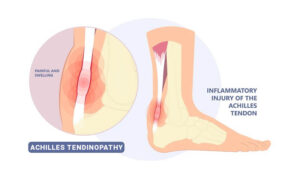About Achilles Tendinopathy
Achilles tendinopathy is a common condition that affects the Achilles tendon, which connects the calf muscles to the heel bone. This condition can cause pain, stiffness, and reduced strength in the lower leg. Left untreated, it can lead to chronic discomfort and limit mobility, particularly for athletes and those with active lifestyles.
Tendons Explained
Tendons are strong bands of tissue that connect muscles to bones, allowing for smooth movement and providing stability. The Achilles tendon is the largest tendon in the body, bearing significant force during activities like walking, running, and jumping.
Symptoms of Achilles Tendinopathy
Common symptoms of Achilles tendinopathy include:
- Pain and stiffness in the back of the heel, especially after physical activity.
- Swelling along the Achilles tendon.
- A grating sensation when moving the ankle.
- Tenderness when touched.
Degrees of Severity of Achilles Tendinopathy
Achilles tendinopathy can vary in severity:
- Mild: Minor discomfort and stiffness, typically felt after activity.
- Moderate: Persistent pain during and after activity, along with noticeable swelling.
- Severe: Intense pain and weakness that may prevent walking or standing for long periods.
Causes of Achilles Tendinopathy
The hidden triggers of Achilles tendinopathy often include:
- Overuse from repetitive activities, like running or jumping.
- Sudden increases in physical activity without proper conditioning.
- Tight calf muscles or improper warm-up before exercise.
- Wearing shoes that lack proper support.
- Underlying conditions like flat feet or obesity, which put excess strain on the tendon.
Diagnosis of Achilles Tendinopathy
A proper diagnosis involves a physical exam and may include imaging tests such as ultrasound or MRI to assess tendon damage and inflammation. Early diagnosis is key to avoiding further complications.
Treatment for Achilles Tendinopathy
Treatment options include:
- Rest and reducing physical activity to give the tendon time to heal.
- Physical therapy to stretch and strengthen the calf muscles.
- Orthotic devices to provide better foot support.
- Anti-inflammatory medications to reduce swelling and pain.
- In severe cases, surgery may be necessary to repair the tendon.
Prevention of Achilles Tendinopathy
To prevent Achilles tendinopathy, it’s important to:
- Warm up properly before physical activity.
- Wear appropriate, supportive footwear.
- Gradually increase exercise intensity to avoid sudden strain on the tendon.
- Stretch the calf muscles regularly to maintain flexibility.
If you’re experiencing symptoms of Achilles tendinopathy or have any concerns about your foot health, contact Southwest Foot and Ankle Center. Our team of experts specializes in foot rehabilitation services and can help develop a personalized treatment plan to restore your mobility and relieve your pain. Contact us today to schedule an appointment!
Contact us
Schedule an appointment
with our podiatrist by contacting us or calling our:

